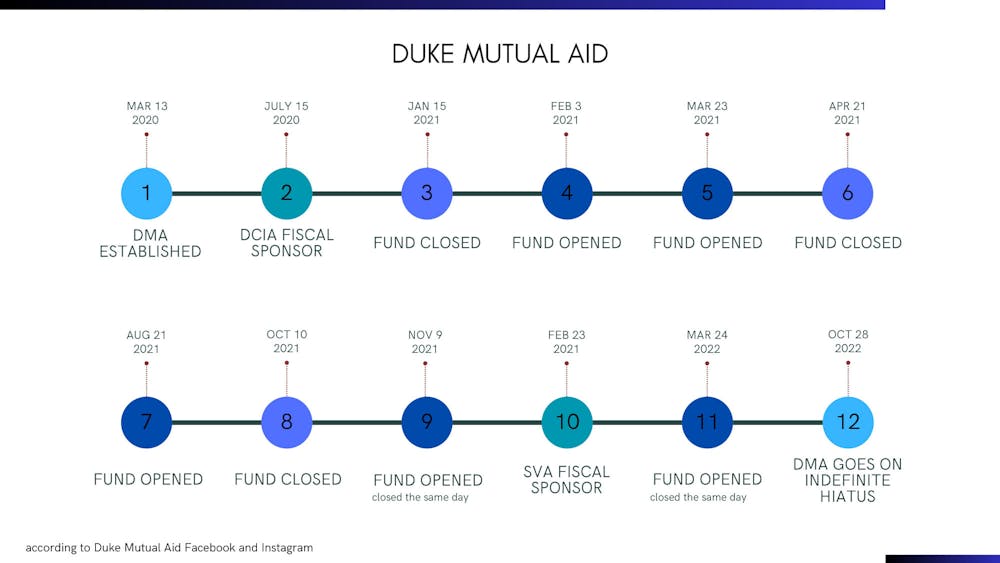On March 27, 2022, junior Jocelyn Chin’s inbox flooded with more than 90 emails within the span of her two-and-a-half hour long class, all addressed to one group — Duke Mutual Aid.
Chin is a member of Duke Mutual Aid, a group founded in response to a Duke policy sending students off campus at the onset of the COVID-19 pandemic in March of 2020. DMA began as a Facebook group to connect students, share resources and address their needs. As Duke’s pandemic policy evolved, DMA eventually focused on gathering and distributing financial resources to the Duke and greater Durham community.
Some of Chin’s emails requested aid because their electricity was out, and others needed money to feed their children. Still others could not afford their rent and faced eviction. When the DMA fund closed in March 2022, it would be the last time recipients would receive funds from the organization prior to an indefinite hiatus.
Over the past two years, DMA has gone through various stages — two shifts in fiscal sponsors, more than five fund closures and several variations in the type of aid and aid recipients.
Initially, it saw success. Within its first year, DMA distributed $46,546.07 to its community. After a series of forced closures starting in 2021, the group announced that it would go on an indefinite hiatus in October 2022, two years after its founding in 2020.
DMA organizers attributed this decline to a number of reasons — less investing, declining publicity and the need for constant maintenance by a small group of organizers. For some, the consequences of the closures became personal.
“I had no idea what boundaries looked like,” said senior Lily Levin, founder of the Duke Mutual Aid Facebook group.
Levin had initially provided her phone number to those who wanted to request money, but she eventually specified that the requests should be through the forms.
“I would get texts at night, like, ‘I’m in the middle of the street with my child’,” Levin said. “It was really hard.”
According to organizers, the internal structure of Duke Mutual Aid was intended to have no hierarchical discrepancies. While people naturally fell into roles based on their work, they tried to resist leadership titles on principle. References to organizers’ roles are meant to clarify the work they were involved in, not official positions within the organization.

Durham in need
In April 2020, the University launched the Student Assistance Fund, one of Duke’s official COVID-19 relief funds. As word slowly spread of Duke Mutual Aid and students began utilizing the SAF, Durham residents began requesting more money and eventually became the primary recipient of funds from DMA.
“As the group became more long-term, fewer students were requesting and more community members were, and we became a group more for the community and less for students,” Levin said.
Between July 15, 2020, and March 20, 2021, 65.5% of the funds were distributed to Durham residents, according to the Duke Mutual Aid Instagram.
One of those Durham residents lost four jobs on the same day.
As people began shutting their doors and isolating themselves at the onset of the COVID-19 pandemic, Stacy Rose, Law School ‘84, lost her catering job, rideshare jobs, work driving elementary students to school and opportunities to babysit.
Throughout 2020 and 2021, Rose gained and lost other jobs, including a temporary job during the election and a remote job at Duke. While she struggled with her income, Rose was still able to stay fed.
Rose would cook food and wait in food pantry lines for people who did not have the time or ability to do it themselves. She connected with other residents over Facebook sites, such as the Durham Mutual Aid site, where requests were made through their form or on Facebook. On some requests for food, Rose would reply on the Facebook group or directly message them to offer help.
“Some people would say, ‘I don’t have any food,’ or ‘My food stamps don’t come in for a week, and I got kids.’ And I would send them a message and find out where they were, and if I could, bring them food,” Rose said.
Despite efforts of residents like Rose to address these needs, the demand was higher than any one person or organization could meet. The Chronicle attempted to contact residents who received DMA resources, but was unable to do so due to the confidentiality of the transactions and limited responses.
However, hundreds of requests were anonymized by DMA organizers on the website.
“A 23-year-old is in need of up to $150 by tonight to prevent eviction of them and their sister. Both parents passed from COVID. Please dm me if you’re able to fulfill all or part of this request,” Levin wrote on the Duke Mutual Aid Facebook page in 2021.
First struggles
The first forced closure of the DMA fund was on Jan. 15, 2021, due to a lack of resources faced with an excess of requests.
This was the first of many closures in the following months as the fund declined.
“We would have a lot of requests, but not a lot of money brought in,” said senior Kyle Gray, the most recent unofficial treasurer of DMA. “We would raise $8,000, or something, and then on the first day we opened our fund, it would all have to go.”
This trend continued with more than five other closures.
The difficulty was in meeting the immense amount of need, which emptied the fund too quickly. At one point, the fund was only open for 17 minutes due to the high volume of requests.
Despite this decline, the fund was still raising money in 2021, just at a slower rate. Duke Mutual Aid distributed over $38,000 to the Durham community, allocating $3,249 through the first half of September and $2,770 through the first half of October.
Attempts to stay afloat
The closures did not occur without internal concern — the group made several attempts to combat the elements that limited their success.
“There was kind of this tension … There's real material need, and we have the ability to give, but also, how do we divorce ourselves from a charity model that has been [ideologically] harmful in the past?” Levin said.
“Crisis response work is a band-aid,” Levin continued. “We tried to be more than a band-aid.”
An initial attempt to combat this was a community resource drive. The drive, advertised as a “Basic Needs Center,” was hosted at the Duke Coffee House in October 2021. The drive attempted to combat what Levin referred to as the “transactional” nature of the fund and move towards more community-building work.
However, the group battled with internal structural problems to resist the “band-aid” model.
“It became a wealth redistribution fund,” Levin said. “We were in this place where we were making decisions of where the money would go because we didn’t have enough of it to support everyone, and that didn’t feel right.”
According to Levin, DMA was intended to resist the norm. Founded by activists who joined together to protest Duke, it directly opposed a Duke policy. For Levin, the group was meant to resist traditional charity models and hoped to resist traditional leadership structures too.
According to Levin, the management of these challenges was passed onto a new generation of leadership, as the first organizers graduated or left to study abroad.
“[The initial organizers] were really trying to create an organization that didn’t have this hierarchical relationship where there are people in charge and everyone listens to them,” said senior Audrey Alexander, the most recent unofficial leader of Duke Mutual Aid. “They didn’t want that because that’s not the goal of mutual aid; it’s an incredibly collaborative effort.”
After the initial organizers left, the group fell back further into those structures.
“There was a shift. A lot of people stopped coming to meetings and participating,” Alexander said. “If we [the four remaining members] don’t — didn’t — do things, they wouldn’t happen.”
To address their internal struggles, the group transitioned fiscal sponsors to try to maximize capacity.
As of February 2021, they have transitioned from Durham Congregations in Action to Southern Vision Alliance. According to Alexander, the new group had more capacity to host Duke Mutual Aid and had a history of working with more radical organizations.
Overrun, overworked, underfunded
By 2022, COVID-19 cases in Durham were dropping, and fewer and fewer people were contributing to the fund. For Levin, the work became “exhausting.”
The number of members of the group began decreasing, going from 10 consistent members to four. Hadeel Hamoud, Trinity ‘22, one of Duke Mutual Aid’s initial organizers, referred to this time as when DMA “really realized the limitations of organizing.”
“When people would reach out, it would be very difficult and would make me feel very cynical about the world a bit,” Alexander said. “It was hard getting those messages every day and not [feel] disempowered.”
On Oct. 28, 2022, the build-up exceeded capacity, and Duke Mutual Aid went on an indefinite hiatus. The remaining money was donated to Durham Mutual Aid.
Despite the successes or failures of Durham Mutual Aid, Rose feels that the need for aid with food and money still exists in a post-pandemic Durham.
According to Gray, the group left on a hiatus, so its relationship with the Southern Vision Alliance “technically” remains open for restarting in the future.
“There are a lot of organizations here [at Duke] intended to help people,” Gray said. “But a lot of it is just sitting in meetings and talking about stuff that we could do, versus Duke Mutual Aid actually made an effect in people’s lives.”
Editor’s note: Jocelyn Chin is an opinion managing editor of The Chronicle’s 119th volume.
Get The Chronicle straight to your inbox
Signup for our weekly newsletter. Cancel at any time.

Jothi Gupta is a Trinity sophomore and a university news editor of The Chronicle's 119th volume.

